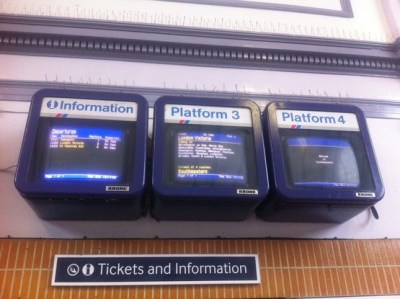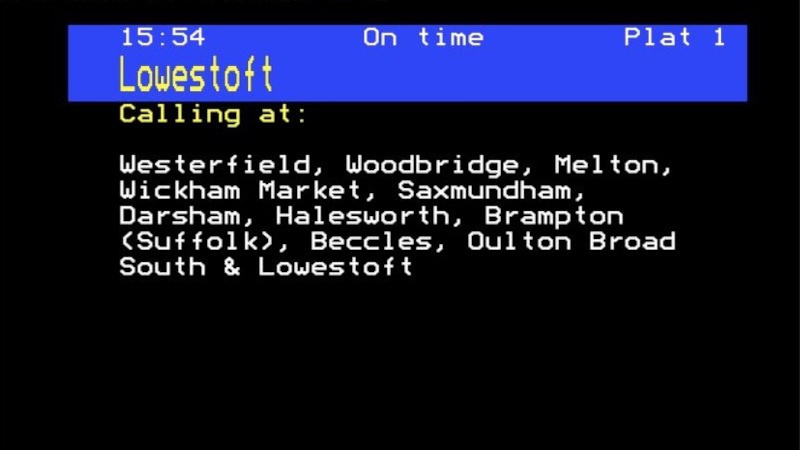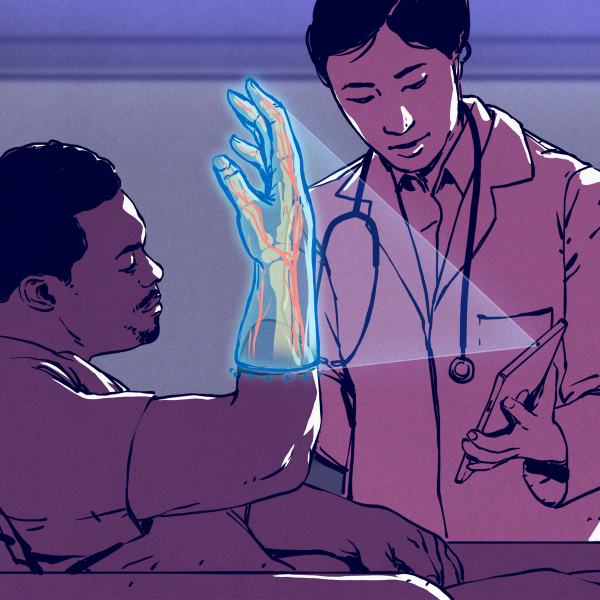The first generation of real-time train information screens for British railways came in the form of suspended color CRTs in familiar rounded fiberglass housings. They were a ubiquitous sight across the network for years, until of course suddenly, they weren’t. Can they be brought back? [Heliomass] has come about as close as it’s possible to be, with a modern emulation that runs from live data feeds.
 The screens were recognizably using the same graphics standards as Teletext, and thus it was no surprise back in the day to see from time to time an Acorn boot screen in a railway station.
The screens were recognizably using the same graphics standards as Teletext, and thus it was no surprise back in the day to see from time to time an Acorn boot screen in a railway station.
We remember some debate at the time as to whether they were running Archimedes of BBC Micro hardware behind the scenes, though it seems likely it might have been the industrial BBC Micro derivative.
The modern recreation uses an emulated BBC Micro for the signage, with a serial connection to a server component running in Python on more modern hardware. This handles grabbing the data and sending it to the Beeb for display. The result is an unexpected bit of nostalgia for anyone who spent the 1980s or ’90s in south east England.
















Nice! I grew up in Essex and travelled a lot on trains in the ’70s through to mid-’90s.
Now we just need a random “explaination for delays” for that real nostalgic feel 😁
Let me start:
Train operator suffering from pinworms.
Lights at railyard burnt out again. Can’t see for nuts.
our cloud provider is down again…
Leaves on the track…
The wrong kind of snow on the track.
“As They Should Be” – Oh come on HAD – way to run a tech blog while insisting we should go back in time and unravel all of the pain-staking changes made for great reasons (even if they’re just stepping stones).
In my opinion – the way it should be starts and ends at the smartphone/smartwatch/earbud – there’s no need to scatter expensive, energy wasting, hard to read/hear, light and sound polluting systems all around the station.
When everybody has smartphone (or equivalent in this regard) technology that can communicate with them any way that they prefer – in their language, audio/visual, vibration, timing etc.
Then we can and should strip all of this equipment and either recycle it (carefully because of harmful components) or put it in a museum.
pains-taking (taking pains : expending, showing, or involving diligent care and effort)
vs. pain-staking (impalement intended to maximize suffering?)
My bad – I should hope most can still understand given the context. I’ve found that my spell checker is somewhat cursed and I’m no better when I’m in the mood to comment. Plz forgive me :)
The “…coward’s way out…” is to blame it on one’s word processor / spell checker. Soon it will be fashionable to blame such errors on ‘a-i’, whatever that is (I’m afraid that “soon” is already here.)
If you had a semi-decent spell checker, it would never have flagged your error (and it most definitely is your error.
Just typed the following into a test document here:
we should go back in time and unravel all of the pain-staking changes made for great reasons
The reasons for any semi-decent spell checker passing this as perfectly acceptable? Consider…
1) “pain” is a valid word.
2) “staking” is a valid word.
3) hyphenation makes the two words a valid compound adjective.
But…if you would like a true expert’s opinion, check with Jenny List who has a long career in the wordsmithing business outside of Hackaday.
I ACCEPT that this was ultimately my error. And yes I might be currently be defined as a coward (except maybe when drunk enough) but that doesn’t change the fact that I am sorry for my minor miscommunication. IMO this is the real BS that could do with deletion haha.
>pains-taking
wolololo I thoght you said “penis-talking” XDDDDD
I truly wish we lived in a world where your comment won’t be deleted because it “offends” people – because you’re not at all wrong to state such a thing :D
I do find that HAD in general seems to uncomfortably (for me) lean towards nostalgia and the history of tech rather than educating people about the very serious and well intentioned reasons for the evolution of technology. There’s mountains of very interesting (to those who care) things to learn but no author seems to be able to capture it properly – instead we just get a mass attractive spin on one aspect of something already going viral elsewhere. (Sorry I’m drunk again)
I can say “it’s neat it using few colors and high contrast for readability, machine font, contains only the most important information, has a wide viewing angle, reminds me of youth” but that’s about it.
I took it as a tongue-in-cheek “opinion”. As when in conversation one might jest “as it should be”.
I did not realize that hackaday and/or one of its authors was authorized to issue mandates.
You’re quite right – but my world is small and hackaday makes up a good portion of it somehow. I should have understood that this was part of a nieche interest and left it alone but I’m struggling to find anywhere that can be the only ones that hear my deeply held opinions/frustrations on matters. x
Sorry, but information screens are important at railway stations and bus stops. You can actually see and read them without getting your phone out, and even more important, you don’t have to Google to find the correct app to use. I travel around from time to time, and finding the correct app to use for a city or country is difficult, extremely difficult at times.
In the future I fore-see we will not need to install an app – it will already be top of a context-aware folder – and like I stated it will not technically require taking out ones phone – it could be displayed one ones smart-watch or spoken directly into ones ear. Funnily enough you’re describing the difficulty with distributed systems and designs rather than a standardized tought-in-youth system. x
Hi there! I’m not a big fan of smartphones; they’ve already permeated society too much.
Smartphones aren’t an enrichment of human life (anymore), but over the years turned into an necessity. A burden.
In real life, we’re forced to own and use them. Being “offline” once in a while now requires an apology.
The iPhone and its successors also ended the classic desktop internet (it still exists to some extent in Japan).
Before smartphones, the internet was a physical place (the family PC, often) to escape from everyday life.
It was an adventure, an escape, and a vast place to meet people. Like a jungle.
Now it’s a dystopia, and the same people who once loved the internet,
or who might been early adopters way back in the 1990s, even,
are now trying to escape back to real life or try to salvage the old web as much as they can (by switching to Gopher, Telnet/SSH-based BBSes, or creating NeoCities websites).
Nevertheless, I’ve always enjoyed using PDAs like Pocket PCs and Palm OS devices.
They were never mandatory, but optional in their time.
They also had optional WiFi or 2G modules available to them, to those needing them.
In that respect, I really like the idea of having alternatives to the mainstream.
Older technologies usually come from a time when things were more thoughtful,
also in parts because people had to sit down and were forced to think on their own to find a solution.
Again, this was also contributed thanks to the lack of smartphones.
So, old technology is not bad per se just because it’s old.
The engine-less bicycle is old, too and is more relevant than ever.
Reusing good concepts and integrating them into contemporary life can prove to be positive. 🙂👍
(Sorry for the bad wording, I’ve used a translator here.)
Don’t be sorry – the translator did a great job – and I empathize with your beliefs – I too have always enjoyed PDA’s, Pocket PC’s, the old internet, and the option of being offline.
I also understand that in the last decade or more company’s have taken advantage for profit and capitalized on our smartphone having – they’ve if anything been showing us how it can be done wrong.
But that shouldn’t completely discourage us in the face of a massive societal revolution that can (help) transform so many different analog / human driven / inefficient and insufficient systems.
Smartphones used to their true potential can (almost completely) end kidnapping, getting lost, exploitation (by individual or gang/company), inequality, social exclusion, thefts, mis-identification, abuse, poor education, addiction, fraud, accidents, extinction of the species, never-ending paperwork / administration, discrimination, security theater, terrorism, scammers, the list goes on including most things from every segment of life… I know it’s a bold claim but quite legitimately the case.
I see them as a very fair trade off (minor burden) (that most of have already accepted) for all that can be revolutionized by their adoption and proper use.
Going forward in this case might be the only way to safeguard and return everything we enjoyed about the freedoms of the past – just with a smart wristwatch or smartphone in a pocket – when done properly they won’t suck up our lives and demand any more than necessary from us while enabling and keeping us safe and connected.
Once society is transformed in the ways it can and seemingly will be by “smarts” then we can meet people easier and safer, sit down and think more / be challenged. I see smartphones being issued for free to every citizen requiring one – they become the new benchmark of access to the world.
Don’t get me wrong – I’ve been watching this modern sh*t show unfold and the only way I see it being actually fixed at this point requires us to do something rather easy and acceptable together to force out the evil that has made it’s self at home everywhere.
All the best, K. x
Thank you! ^^
Best wishs, vy73s
“When everybody has smartphone”
I don’t and never will.
I hate this society requiring an account on Google or Apple in order to be a citizen.
Don’t mistake the way company’s are fighting over your data/attention with what the hardware is actually capable of – used correctly one should only require one (cryptographically secure and national/global government held) account for everything in life – like a birth certificate – then company’s can only politely ask you to share certain amounts of that data with them for specific purposes – it will end the need for hundreds of accounts (per person) and wide-spread sharing (and abuse) of your personal information.
“I don’t and never will.” – and honestly there will be space for (some) people who refuse to make this change – but it might be a major burden (like being The Amish). After-all we always need a sufficient control group / backup plan.
It’s already happening in Belgium if you want to take the train, you cannot travel anonymously if you buy a ticket via the SNCB app, you have to give your name, email address etc. While before you could you buy a ticket with cash and do not reveal your identity. We turned the internet into a surveillance machine, like in 1984. And it’s getting worse and worse.
I’m replying to my own comment since seemingly HAD limits comment depth – but you’re right – it’s already happening – one should not need to enter their name and email address to “prove” their identity although for good reason. If anything I wish I could convey that “surveillance” is not all bad.
There are genuinely justifiable and sad reasons (at least at the moment) for these measures but it’s not the end goal – actually very far from. I understand why it is exceptionally (and only currently increasingly difficult) to trust the government but who else are we supposed to put our trust in (if anyone / anything) x
Let’s be fair, Network Rail had the bright idea of replacing many of the departure boards at Euston with advertising animations. At a station famed for late notice platform changes, and overcrowding it didn’t end well. They have since backtracked. Whilst it is fun to predict the departure platform using the likes of traksy, departure boards keep stations working.
First installations 1986. Archimedes released 1987.
So they would originally have been BBC micro. 1980s BR didn’t spend money it didn’t have to either so if they switched to Archimedes they’d have had to have a reason.
Also, the SAA5050 output looks very different to the pixelated emulated mode 7 of the Archimedes.
I was a c. 2016-2019 UK resident, so my idea of how it oughta be features a matrix of LCD monitors. How the information is displayed on a departure board may have changed, but I’ll wager when hasn’t: about 5 minutes before.
The crowd waits expectantly, the display updates… and they’re off! Not an unseeming sprint to the appropriate platforms mind you, but certainly with a spring in their step. This took some getting used to for my wife, not having been a rail habituate until arriving in its birthplace.
I would love to see this hooked to an original BR departure board CRT!
So… I’m confused… according to the info on the display (if I understand correctly) telephone call are only allowed at the stations: Westerfield, Woodbridge,…